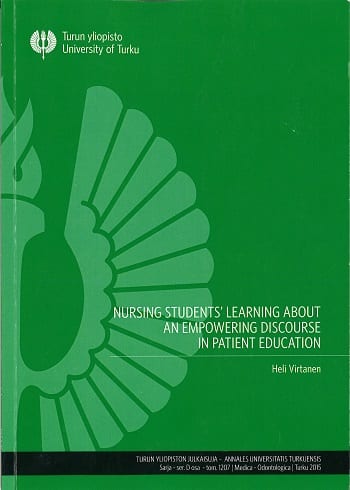Competence
In empowering patient education, the competence of professionals is an important factor. Research focuses on nursing students’ and nurses’ competence in empowering patient education. In this field, a computer simulation program of empowering discourse has been developed, tested, and evaluated in nursing education. The simulation program is further tested in developing nurses’ competence in empowering discourse. Also, an instrument to evaluate nurses’ competence in empowering patient education has been developed and it will be tested and validated nationally and internationally.
In this field, the evaluation of the educational competence of nurses is also connected with the ProComp -project, measured by Nurse Competence Scale (Meretoja 2004). In this part, the educational competence is analyzed among graduating nursing students, and in the early years of their career. This part is collaborative between six European countries and coordinated by the University of Turku, Department of Nursing Science.
Competence of empowering patient education
Principal investigator: Heli Virtanen, Docent, PhD, RN, Department of Nursing Science, University of Turku
hetuvi(a)utu.fi
+358 29 450 3148
+358 50 306 4134
The research project focuses on the evaluation of competence in empowering patient education. Empowering patient education is not only giving and getting information, but it should be a mutual dialogue between a patient and nurse demanding nurses’ high competence. New learning and teaching methods are needed in nursing education and nurses’ in-service training for developing nurses’ competence in empowering patient education.
The project includes the two sub-studies:
Competence in empowering patient education
The aim of the study is to evaluate nurses’ competence in empowering patient education
- A descriptive study on realization of empowering patient discourse and discussion of emotions in the discourse 2019 – 2020
- A descriptive study on development and assessment of the usability of an e-learning program for nurses on Empowering Discourse in patient education
- Intervention study on nurses’ competence in empowering patient education 2020 – 2022
Developing and testing an instrument for evaluation of competence in empowering patient education (CompEPE)
The aim of the study is to develop and test an instrument for the evaluation of competence in empowering patient education.
- Health care workers’ competence in empowering patient education 2019 – 2020
Publications:
Eskolin, S.-E., Inkeroinen, S., Leino-Kilpi, H., & Virtanen, H. (2023). Instruments for measuring empowering patient education competence of nurses: Systematic review. Journal of Advanced Nursing. https://doi.org/10.1111/jan.15597
Empowering patient education competence in sleep apnea
Doctoral researcher: Taina Heinonen, MHSc, RN
Department of Nursing Science, University of Turku
thhein(a)utu.fi
Supervisors: Helena Leino-Kilpi, Professor emerita, PhD, RN, Department of Nursing Science, University of Turku and Turku University Hospital
Heli Virtanen, Docent, PhD, RN, Department of Nursing Science, University of Turku
Medical expertise supervised by Docent Adel Bachour, Department of Pulmonary Diseases, Helsinki University Hospital
The aim of this two-phased study is to evaluate nurses’ patient education competence and patients’ empowerment in CPAP initiation and first follow-up control and evaluate if there is a difference between them.
Phase 1) A literature review: Describe nurses’ patient education competence
Phase 2) Nurses’ patient education competence in supporting the empowerment of patients with sleep apnea evaluated in surveys
Part 1) Nurses’ patient education competence in supporting the empowerment of patients with sleep apnea in CPAP treatment initiation with structured questionnaires and
Part 2) Nurses’ patient education competence in supporting the empowerment of patients with sleep apnea in the 1st CPAP treatment follow-up control with structured questionnaires.
The significance of the research
Nursing in sleep apnea needs more support due to increased patient amount. Obstructive sleep apnea has personal, societal, public health, and legal implications (Morsy et al. 2019). Resources are limited in the public health system to treat and follow up effectively all sleep apnea patients. The public health system cannot respond to all the patients’ expectations. Nurses’ role is important to support the empowerment of patients with sleep apnea in life at home. The health care system could save resources, as time and money, if the patients are empowered and they need less support from the public health system.
The study results could be used to develop nurses’ patient education competence in supporting the empowerment of patients with sleep apnea during the CPAP care pathway. Empowering patient education in sleep apnea has not been researched earlier and new information is needed to support patients’ empowerment with sleep apnea. The results can be used as suggestions for developing nurses’ education to support patients’ empowerment in sleep apnea.
Professional competence in nursing
ProComp project
Principal investigator: Helena Leino-Kilpi, Professor emerita, Nurse director, PhD, MEd, RN, FAAN, FEANS, MAE,
Department of Nursing Science, University of Turku
Turku University Hospital
helena.leino-kilpi(a)utu.fi
+358 29 450 2455
+358 50 342 4384
The aim of this research is
- to assess and compare the level of competence development at the transition period in Finland and five other European countries;
- to explore individual, educational, organizational and value-based factors connected with the level of competence at the transition period, and
- to model factors contributing high level of competence and a successful beginning of the transition period and the nurse career.
For more information, please visit the main website of the project: Professional Competence in Nursing
Master's theses
There are several master’s theses conducted in this field. See the list of publications.
Recent master’s theses:
